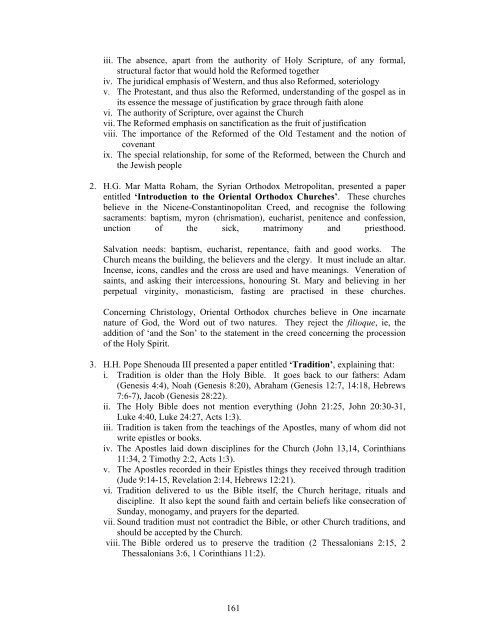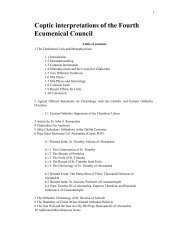Coptic Church & Ecumenical Movement - Saint Mina Coptic ...
Coptic Church & Ecumenical Movement - Saint Mina Coptic ...
Coptic Church & Ecumenical Movement - Saint Mina Coptic ...
You also want an ePaper? Increase the reach of your titles
YUMPU automatically turns print PDFs into web optimized ePapers that Google loves.
iii. The absence, apart from the authority of Holy Scripture, of any formal,<br />
structural factor that would hold the Reformed together<br />
iv. The juridical emphasis of Western, and thus also Reformed, soteriology<br />
v. The Protestant, and thus also the Reformed, understanding of the gospel as in<br />
its essence the message of justification by grace through faith alone<br />
vi. The authority of Scripture, over against the <strong>Church</strong><br />
vii. The Reformed emphasis on sanctification as the fruit of justification<br />
viii. The importance of the Reformed of the Old Testament and the notion of<br />
covenant<br />
ix. The special relationship, for some of the Reformed, between the <strong>Church</strong> and<br />
the Jewish people<br />
2. H.G. Mar Matta Roham, the Syrian Orthodox Metropolitan, presented a paper<br />
entitled ‘Introduction to the Oriental Orthodox <strong>Church</strong>es’. These churches<br />
believe in the Nicene-Constantinopolitan Creed, and recognise the following<br />
sacraments: baptism, myron (chrismation), eucharist, penitence and confession,<br />
unction of the sick, matrimony and priesthood.<br />
Salvation needs: baptism, eucharist, repentance, faith and good works. The<br />
<strong>Church</strong> means the building, the believers and the clergy. It must include an altar.<br />
Incense, icons, candles and the cross are used and have meanings. Veneration of<br />
saints, and asking their intercessions, honouring St. Mary and believing in her<br />
perpetual virginity, monasticism, fasting are practised in these churches.<br />
Concerning Christology, Oriental Orthodox churches believe in One incarnate<br />
nature of God, the Word out of two natures. They reject the filioque, ie, the<br />
addition of ‘and the Son’ to the statement in the creed concerning the procession<br />
of the Holy Spirit.<br />
3. H.H. Pope Shenouda III presented a paper entitled ‘Tradition’, explaining that:<br />
i. Tradition is older than the Holy Bible. It goes back to our fathers: Adam<br />
(Genesis 4:4), Noah (Genesis 8:20), Abraham (Genesis 12:7, 14:18, Hebrews<br />
7:6-7), Jacob (Genesis 28:22).<br />
ii. The Holy Bible does not mention everything (John 21:25, John 20:30-31,<br />
Luke 4:40, Luke 24:27, Acts 1:3).<br />
iii. Tradition is taken from the teachings of the Apostles, many of whom did not<br />
write epistles or books.<br />
iv. The Apostles laid down disciplines for the <strong>Church</strong> (John 13,14, Corinthians<br />
11:34, 2 Timothy 2:2, Acts 1:3).<br />
v. The Apostles recorded in their Epistles things they received through tradition<br />
(Jude 9:14-15, Revelation 2:14, Hebrews 12:21).<br />
vi. Tradition delivered to us the Bible itself, the <strong>Church</strong> heritage, rituals and<br />
discipline. It also kept the sound faith and certain beliefs like consecration of<br />
Sunday, monogamy, and prayers for the departed.<br />
vii. Sound tradition must not contradict the Bible, or other <strong>Church</strong> traditions, and<br />
should be accepted by the <strong>Church</strong>.<br />
viii. The Bible ordered us to preserve the tradition (2 Thessalonians 2:15, 2<br />
Thessalonians 3:6, 1 Corinthians 11:2).<br />
161








